If you’re looking at adding things to your self care routine, you may have heard of weighted blankets. As the name suggests, weighted blankets are blankets that have weight to them. They come in a variety of weight options, from as light as 5 lbs, to as heavy as 40 lbs.
But with this weight comes added materials that don’t always allow for airflow. So, are weighted blankets hot? The short answer is: more often than not, yes. But keep reading to find out the different types of blankets and how hot or cold they might feel.
Types of Weighted Blankets
Weighted blankets come in a few different styles, and I’ll break them down one by one below. But no matter which style you choose, they all have the same goal.
Some benefits of weighted blankets are that they can help people feel safe and calm while they use them. They simulate something called Deep Touch Pressure (DTP), which is just a name to the “hugging sensation” that weighted blankets are known for.
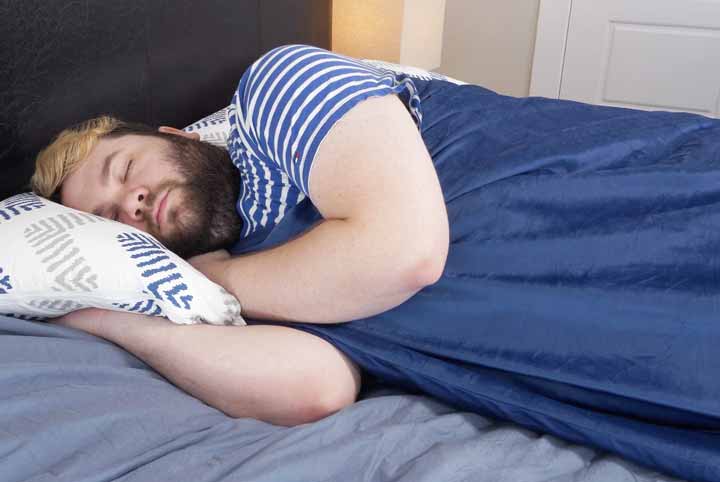
If you toss and turn during the night, weighted blankets can help you stay in one spot. Because of the DTP sensation, weighted blankets can help your body release more melatonin, which in turn helps you fall asleep and stay asleep.
This is just a quick overview of how weighted blankets can help, but for a more detailed article, be sure to read through our weighted blanket pros and cons. In the end, they are blanketsl, so they usually add some extra warmth. But let’s go over the different styles of weighted blankets, going from coolest to warmest.
Knitted Weighted Blankets
Often called “chunky-knit” weighted blankets, these are exactly what they sound like: weighted blankets that feature a knit design. In my opinion, these are the best weighted blankets for hot sleepers.
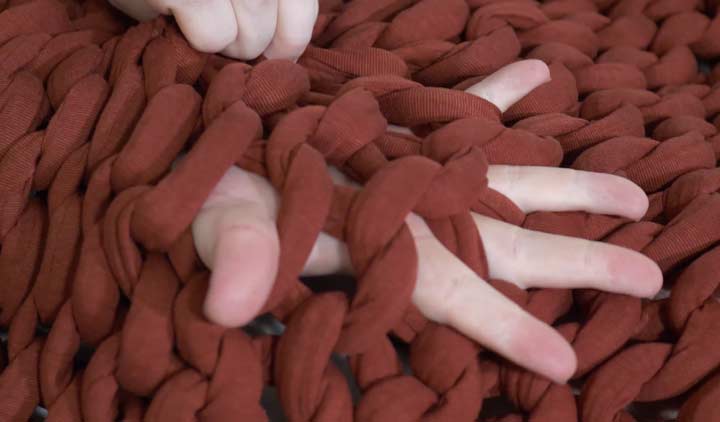
The loops literally open up and allow for airflow. And some knitted weighted blankets, like the Bearaby Tree Napper, contain TENCEL. This is a fabric made from eucalyptus tree pulp, and it’s naturally cooling and moisture-wicking. When you couple this with the open-knit design, there’s not really any danger of overheating.
Duvet-Style Weighted Blankets
This is probably the most popular weighted blanket design. Duvet-style weighted blankets usually have some sort of outer cover and a weighted insert. In some cases, you could use the insert by itself, but the duvet cover protects the weighted insert and helps it stay clean. And the outer, removable covers are usually machine-washable so you don’t have to wash the heavy insert.
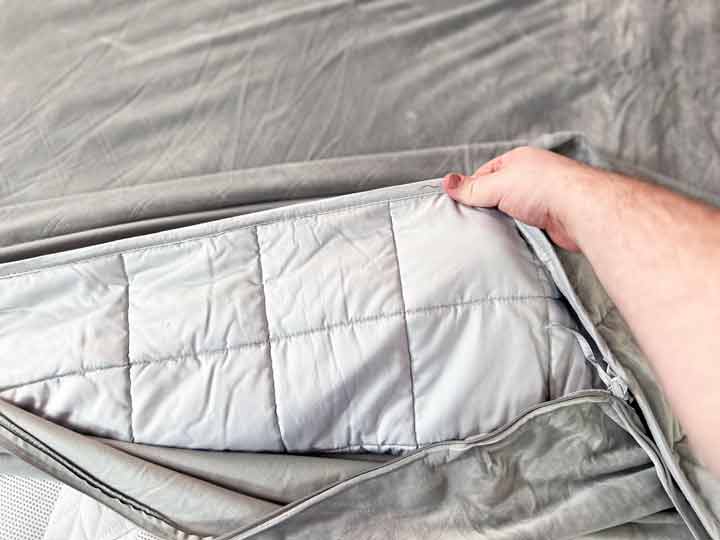
This outer cover can be made of a number of materials, from breathable cotton, bamboo, and TENCEL, to warm, minky polyester.
Traditional Weighted Blankets
The “traditional” weighted blanket design is essentially what you find inside of the duvet style blankets, just without corner loops to attach a duvet cover to it. The fabric shell is often sewn through to keep the weighted fill evenly distributed throughout the blanket. This outer shell can be made from a variety of materials, from cotton to polyester. Take a look at our Layla and Baloo reviews to learn more about this type of weighted blanket.
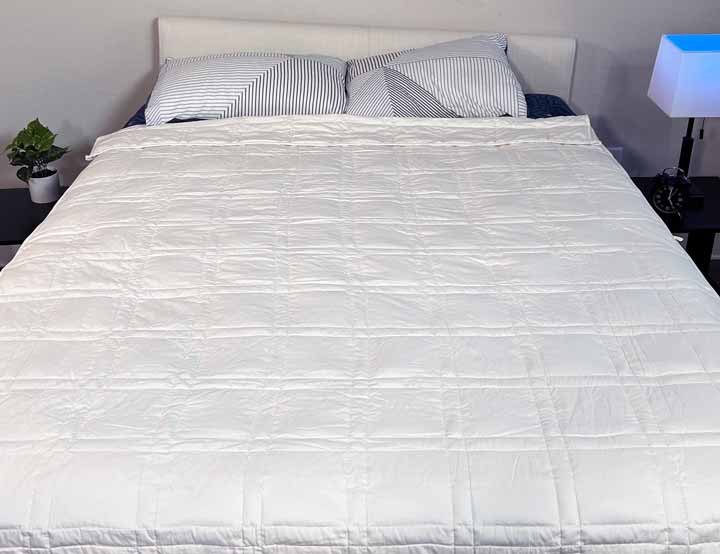
Because you’re relying on just the fabric shell for things like cooling or breathability, these styles of blankets tend to sleep the hottest.
Cooling Weighted Blankets: What to Look For
Let’s cover some of the basics on what to look for in cooling weighted blanket
Breathability
Materials such as cotton, bamboo, and TENCEL feel breathable and cool.. But as I mentioned earlier, knitted weighted blankets tend to be the most breathable; they will literally open up and let air come through. This helps people feel more comfortable and not so stuffy while using a weighted blanket.
But that’s not to say other types of weighted blankets can’t be breathable. While air won’t easily flow through the weighted fill, the material is still important. Plant-based fabrics like cotton and bamboo are more breathable than synthetic fabrics like polyester.
Cooling Covers
If you want to go with the duvet-style weighted blanket, look for an outer cover that’s made with cooling fabrics like bamboo or TENCEL. In my opinion, these two do a better job at staying cool over cotton, which is really only good for its breathability.
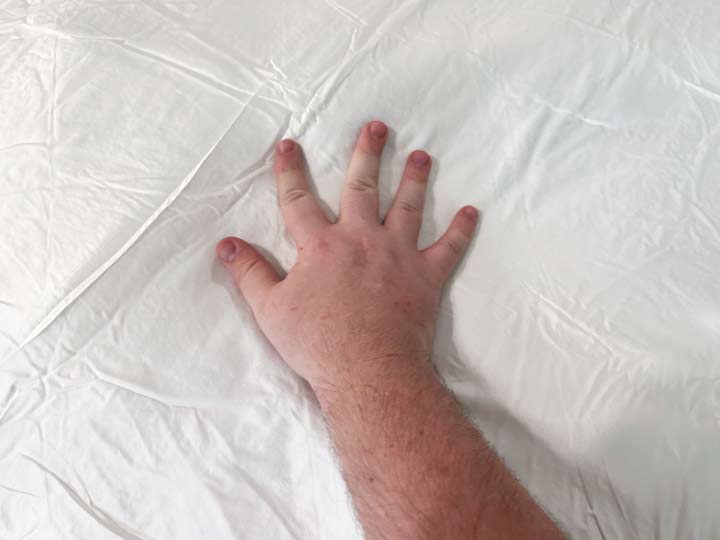
One of the best cooling weighted blankets I’ve reviewed is the LUXOME weighted blanket because it has a bamboo outer cover. I’ll be honest, I’m a bit biased towards bamboo as a whole, but even with the weighted insert, the bamboo cover did a great job at keeping the heat level low. If you’re a hot sleeper like myself, bamboo is a great material to keep you cool.
Moisture-Wicking Materials
If it’s not made clear at this point, plant-based fabrics like bamboo and TENCEL are king when it comes to cooling. Both are moisture-wicking as well, which means they shouldn’t make you feel sweaty. TENCEL is also cool-to-the touch, giving it one leg up over bamboo.
Some polyester materials, however, are designed to fight the heat and keep moisture off of you while you sleep. The Sleep Number True Temp weighted blanket uses a unique polyester material called 37.5 active particle technology. This material can adjust to your body temperature, keeping you warm and cozy when you need it, but when the temperature starts to go up the material will dissipate heat and wick away moisture.
How Heavy Should My Weighted Blanket Be?
Weighted blankets come in a range of weights. The most common weight options are 10, 12, and 15 lbs, but they can be as light as 5 lbs or as heavy as 35 or 40 lbs. With so many options available, it might be confusing on which to pick, especially if this is your first weighted blanket.
The general rule of thumb is to take 10% of your body weight (or divide your body weight by 10) and that’ll be the ideal weight, give or take a pound or two. For example, if you weigh around 225 lbs, 10% of that is 22.5 lbs. You could go either 20 lbs or 25 lbs based on that. But, we also have a weighted blanket calculator to help make it easy for you.
How To Sleep Cooler at Night
So, you’ve got a cooling weighted blanket but still feel a little toasty underneath it all. There are some ways you can cool off while you sleep, in addition to turning on that ceiling fan and cranking down the air conditioner. Let’s cover some different ways you can cool off.
Sleep Naked
Pajamas are nice and comfy when you’re lounging in bed or on the couch, but clothes might add to the heat when you pull over the covers. So, one way you could beat the heat is just shedding that extra layer of fabric.
There are many benefits to sleeping naked, but helping you feel cooler is the important one here. Having your clothes off can help your body regulate temperature, which means you should feel more comfortable.
RELATED: Should You Sleep Naked?
Get Cooling Sheets
Those materials used for the cooling covers I mentioned above? They make entire sheet sets out of them, too. I sleep with a set of bamboo sheets every night. For the longest time, I slept hot because I used polyester sheets. Making the change to bamboo sheets, in my opinion, is worth it if you’re a chronic hot sleeper.

Bamboo feels super soft and almost silk-like, which is a texture I prefer. Cotton, TENCEL, and linen sheets are also great for hot sleepers thanks to their breathability. And when you pair this with the moisture-wicking properties found in bamboo and TENCEL, you won’t sleep hot. I’ve also rounded up a list of our best cooling sheets, if you want some suggestions.
Add a Cooling Mattress Topper
If your bed is a source of heat, but you’re not in a position to get a brand new mattress, investing in a cooling topper is a great, more affordable option. Toppers made with gel-infused memory foam are good for hot sleepers who like a slow-moving feel. The gel infusion helps pull body heat away, which keeps you from overheating.
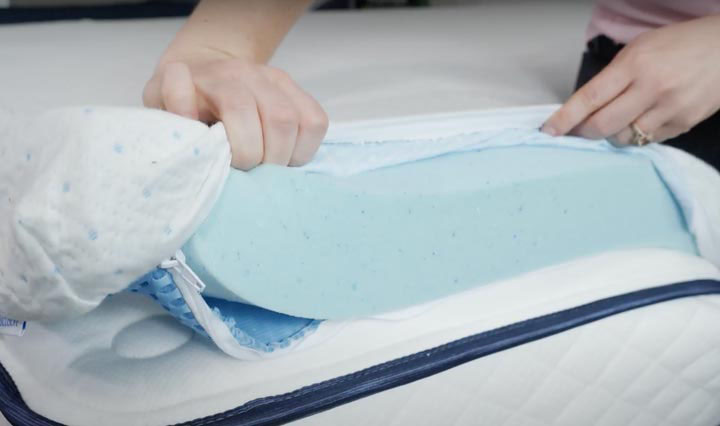
But if you’d rather sleep more “on top” of your mattress, latex toppers are cooling, bouncy, and responsive. Latex toppers are often perforated with holes, which allow for airflow. For more options, we’ve put together a full list of the best cooling mattress toppers we’ve tested.
Try the BedJet Climate Comfort System
If you want to keep the electric bill a bit lower and keep the AC off during the night, but the ceiling fan isn’t cutting it, the BedJet is a good option. It’s basically a small air conditioning unit that you can use in bed. You just hook it up to your mattress and it’ll blow air directly on you to keep you cool.
Get a Cooling Mattress
If you are just ready to gut your whole room and start anew, you may want to get a cooling mattress. More often than not, you’ll want to consider a hybrid bed, which combines both coils and foam for a balance of comfort and support. The coils allow for a lot of airflow and most of the time, the foam will have a gel infusion. Some companies, like Helix and Brooklyn Bedding, will even let you add a cooling cover (albeit for an extra fee) to really get that cooling experience.
Are Weighted Blankets Hot FAQs
How do you stay cool with a weighted blanket?
Go for a knit weighted blanket or use a blanket that has a bamboo outer cover. The knit blankets let air flow through, which helps keep hot spots from forming. Breathable and moisture-wicking fabrics like bamboo are, in general, great for hot sleepers because they won’t make you feel hot and sweaty.
Are weighted blankets OK for summer?
Yes, weighted blankets are OK for summer if they contain cooling and moisture-wicking materials. Look for fabrics such as bamboo or TENCEL, both of which are known for staying cool.
Is it OK to sleep with a weighted blanket every night?
Yes, it’s completely OK and safe to use a weighted blanket every night. The only people that shouldn’t use weighted blankets are those with health concerns or toddlers and babies. The blankets are too heavy for toddlers and babies. Using the 10% rule, children around 50 lbs and up should be safe to use weighted blankets, given the proper weight option. If you have health concerns, it’s best to consult your doctor about weighted blanket usage.


